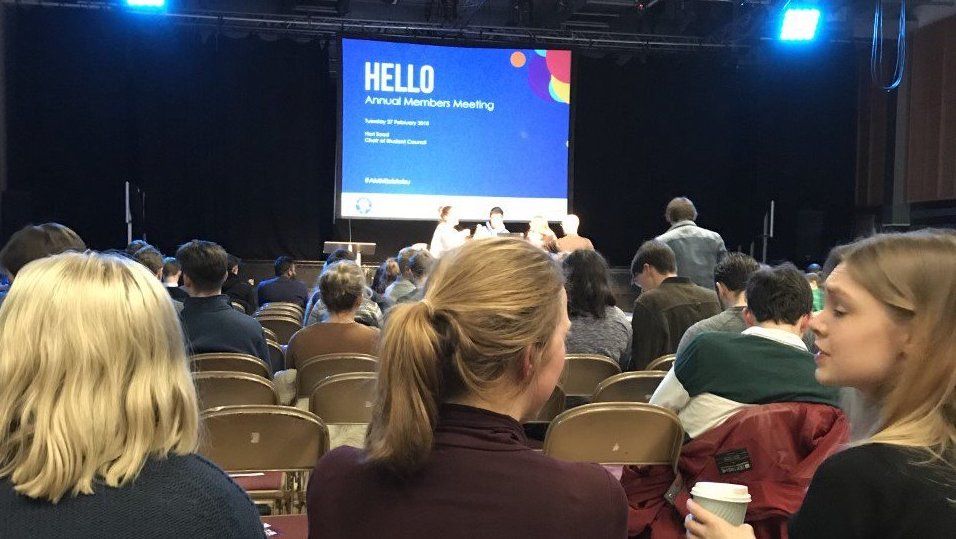Epigram is an independent and neutral newspaper, aiming to publish opinions from across the student body. To respond with an opposing opinion, please contact comment@epigram.org.uk or join our writers group
In response to a recent article arguing that the SU's Annual Members' Meeting is an illusion of student democracy, Chair of the Student Council, Hari Sood, proposes that student democracy in Bristol can be strengthened if more students were engaged.
A couple of weeks ago, an article was brought to my attention about the SU’s Annual Members’ Meeting (AMM), which I chaired in late February. I thought it was pretty good. The writer touched on many different facets of SU democracy, brought up many important issues and posed the kind of questions I think students should be asking: why is my SU not representing me, and what can be done about it?
The SU's Annual Members Meeting is an illusion of student democracy, argues Oliver Chapman https://t.co/iLLCXOh8VU pic.twitter.com/7yNOJGB705
— Epigram (@EpigramPaper) 4 March 2018
But before we get into the meat of the matter, I feel it worth clearing up a couple of things about the SU’s democratic procedures. For either Student Council or AMM, any student can submit a motion on anything they like. These then come to the Democratic Standards’ Committee (DSC), who assess them on a number of factors: whether the motion needs to come to Student Council, or can be done immediately through one of the Networks (introduced last year to prioritise and speed up action), whether the motions are in line with the SU’s charitable objectives and whether it is an issue that students will be engaged in talking about.
For AMM, we released a priority ballot. All students were able to vote for the order in which we addressed motions on the SU Website, and the results of that were what set the agenda. All students are then invited to the meeting to engage in and vote on the policies being brought forward, and if they pass (and are confirmed to be within the SU’s charitable objectives by the Trustee Board), they become SU Policy for 3 years. At Student Council, the process is the same, but it is restricted to student leaders.
All students are invited to the meeting to engage in and vote on the policies being brought forward
At no point in this process is anything done under any particular guise or with hidden motives. No bias is shown to any policy brought forward. In the meetings, nothing is prioritised higher than ensuring that those that want to be heard are heard. If someone has a question, they are invited to ask. If someone wants to hold an Officer accountable, they are invited to do so. If someone has heard enough and would like to get to vote, they are invited to alert the Chair. Whatever the student body has chosen or chooses to do, is what is done.
This is how student democracy currently works. We are not in any way under the illusion that the system is perfect. The fact that only 1 AMM has been quorate in the last 5 years, along with no quorate student councils last year, is deeply worrying and strongly suggestive of a system that needs change. The Networks model was introduced to combat these flaws, yet this is still clearly not enough.
Latest from Epigram: The SU election shows that student democracy can be exciting https://t.co/mWRGa88Aiz
— Epigram (@EpigramPaper) 20 March 2018
For me, at the heart of everything are three major areas that need improvement; engagement, transparency and communication. As we stand, the amount of students regularly engaging with SU democratic processes is disappointing at best. It is neither clear nor effectively communicated what Student Council is, how policy works and what abilities any given student has to participate in these meetings, resulting in an apathy for the entire procedure.
A lot of this is down to the SU. As the organisation whose job is, amongst a range of other things, to represent the student body, it needs to prioritise involvement, engagement and faith in it as an establishment- after all, the best student life requires students. Clearly something needs to change.
The SU needs to prioritise involvement, engagement and faith in it as an establishment
But it is not solely down to the SU. Regardless of what the SU does, it can’t control who decides to be interested in submitting motions, who comes to meetings, who speaks at the meetings and which motions pass. It can’t control the will and the voice of its members. These things are down to the initiative of students.
The SU isn’t some kind of other-worldly, foreign place where only the most out of reach people exist- the people who work there are just normal people, some elected by you, who spend every working day trying to improve your student life. They don’t have all the answers. The SU is there to listen to your concerns and ideas and act upon them to improve things as they stand.
Through getting involved, through proactively taking part in the processes that the SU provides, I have been able to utilise what the SU has to offer
I have spent a fair amount of my Uni time in the SU, and don’t think that it hasn’t frustrated and annoyed me at times. But through getting involved, through proactively taking part in the processes that the SU provides, I have been able to utilise what the SU has to offer and learn to understand the worth of the organisation. I always seek feedback for the meetings I chair, and am more than happy to meet with anyone (perhaps the article writer) who has ideas for how to improve them.
The article has brought to light many things that need to be improved about the way that we do democracy at the SU, and I am grateful. But solutions can’t just be plucked out a hat- they need careful thought, activity and drive to implement them, not just from the people that work there but from the people that want to see the change as well. The SU is always open to being improved. It just needs some students to come and initiate it.
Featured Image: Epigram / Nikki Peach









